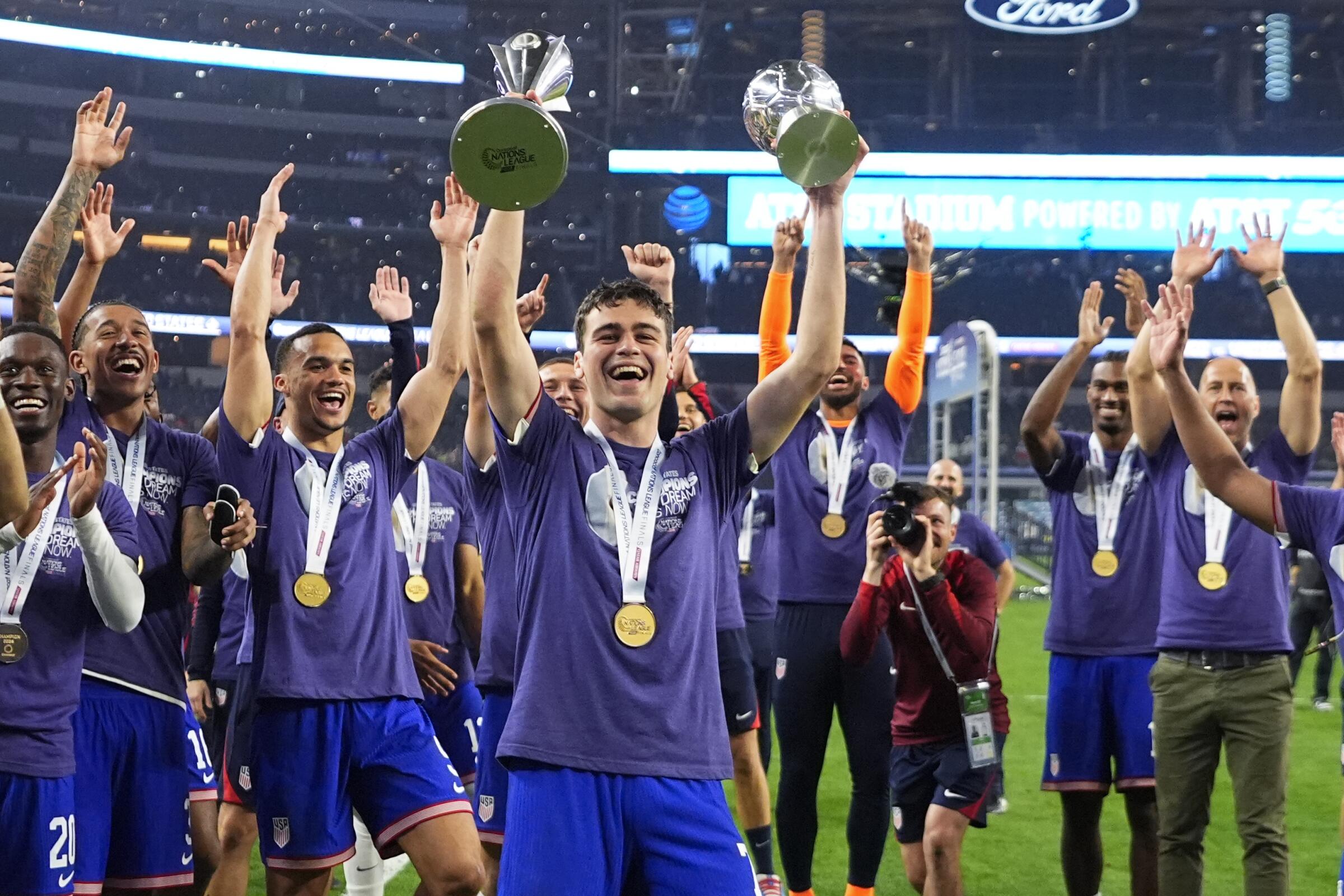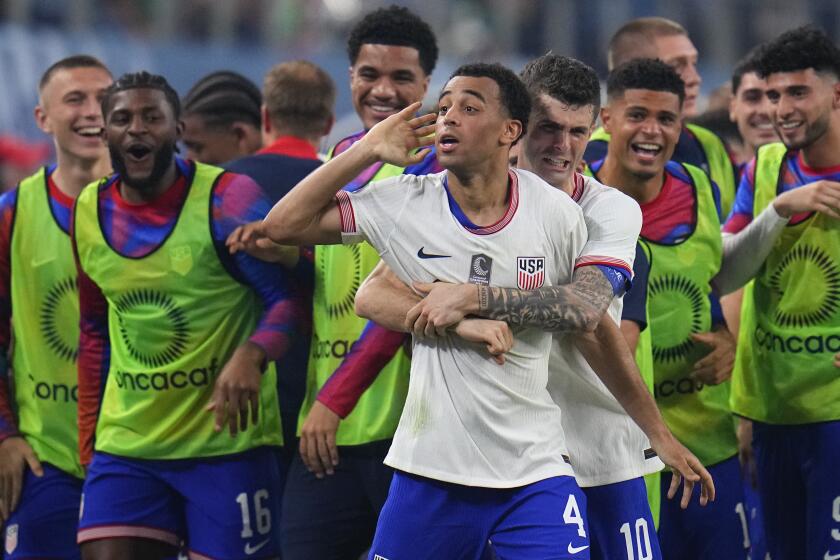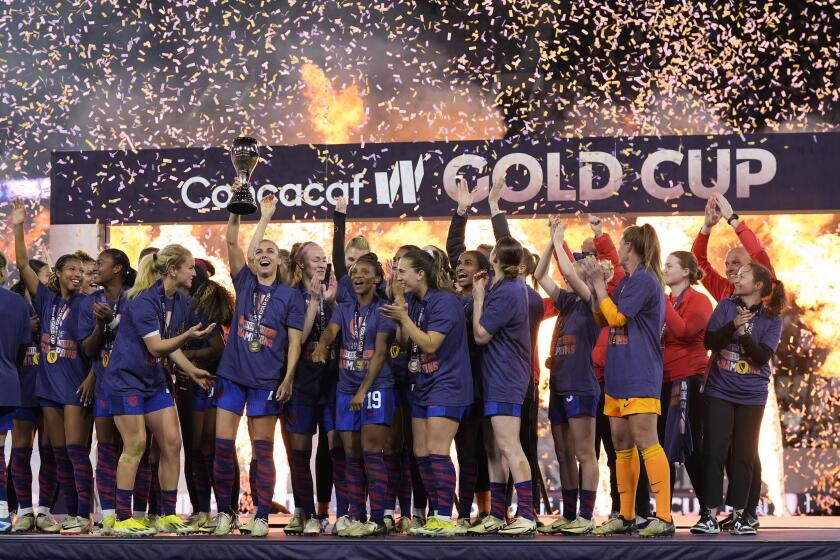Kevin Baxter writes about soccer and hockey for the Los Angeles Times. He has covered seven World Cups, five Olympic Games, six World Series and a Super Bowl and has contributed to three Pulitzer Prize-winning series at The Times and Miami Herald. An essay he wrote in fifth grade was voted best in the class. He has a cool dog.
- Share via
1
Remember when the Mexican national team was good? It’s certainly been a while.
The latest implosion came Sunday night in a 2-0 loss to the U.S. in the CONCACAF Nations League final in Arlington, Texas. And the meltdown was complete, both on and off the field.
On the field, Mexico put just two shots on goal in losing to the U.S. in the final four of the Nations League for a third straight year. That leaves the U.S. unbeaten (5-0-2) in a record seven consecutive meetings with El Tri. In five of the last six games, Mexico hasn’t even scored.
Remember when U.S.-Mexico was a rivalry? That’s certainly been a while too.
The Mexican national team program is arguably at its lowest point in decades. El Tri exited the last World Cup in the group stage for the first time in 44 years, has won just one trophy since 2019 — that coming in last summer’s Gold Cup — and failed to qualify for this summer’s Olympics, missing the tournament for the first time since 2008.
The team has gone through three managers in 15 months and could be making another change shortly since El Tri has won only three of its last nine games under current coach Jaime Lozano.
Tyler Adams and Gio Reyna score for the United States in a 2-0 victory over Mexico in the CONCACAF Nations League title match.
That decline didn’t happen overnight, and it won’t be solved overnight either. However, with the 2026 World Cup, which Mexico will open at home just more than two years away, time is running short.
The Mexican team has grown old in recent years — it had the second-oldest roster in the last two World Cups — partly because the pipeline that had long supplied talent to the national team has run dry. Guillermo Ochoa, who started in goal Sunday, made his international debut while George W. Bush was president and before Gio Reyna, who scored against Ochoa on Sunday, was old enough for preschool.
Yet Lozano has called up just one keeper in the last 12 months who has more than four international caps.
Age isn’t the only thing separating the U.S. and Mexico. Twenty-one of the 23 players called up to the American team this month play in Europe — many have been there since they were teenagers — while 13 of the 23 men on the Mexican roster play in the country’s domestic Liga MX.
And they’re not even the best players in that league since 14 of the top 19 goal scorers and four of the five top goalkeepers in Liga MX were born outside Mexico.
That’s a problem.
“The time at which they send the players to the European clubs, that makes a difference,” Lozano said when asked how the U.S. has separated itself from Mexico. “Today they’re in very good leagues, they compete in different [kinds of] games every week.”
One of those players is Reyna, who, at 17, became the youngest American to play in the German Bundesliga and, at 21, has already appeared in 125 games in all competitions in Europe.
The U.S. men’s and women’s soccer teams learned their opening matchups for the Paris Olympics Wednesday, with the women facing a tougher field.
Less than a year ago, U.S. coach Gregg Berhalter’s future with the national team was very much in doubt, largely because of a row involving Reyna and his parents that erupted during the World Cup. In the Nations League, Reyna saved Berhalter twice, assisting on the two extra-time goals that beat Jamaica in the semifinal, then putting the final nail in Mexico’s coffin with his second-half goal in the final.
Off the field the Mexican fans were even worse, pelting the U.S. players with beer and other trash after Reyna’s goal in the 63rd minute. U.S. captain Christian Pulisic said he had beer thrown at him before the game started.
In the first Nations League final in 2021, Reyna needed medical attention after being struck by a bottle thrown from the stands while he was celebrating Pulisic’s game-winning goal in extra time. That game, in Denver, was delayed twice by the officials after fans in the pro-Mexican crowd shouted an anti-gay slur on U.S. goal kicks. Last year’s tournament semifinal, which the U.S. won 3-0, was also stopped twice by the chant, as was Sunday’s game, which also featured a brawl between supporters of the two teams in the stadium’s second deck.
CONCACAF responded once again by clutching its pearls and issuing another toothless statement, saying it “condemns the discriminatory chanting” and “will continue to urge fans to support their teams positively and with respect for the opposition.”
Sure. That ought to do it.
What CONCACAF didn’t do, at least publicly, was issue any penalties — not that any punishment is likely to make a difference as long as the shameless Mexican soccer federation continues to ignore and deflect the issue.
When Mexico was sanctioned by FIFA for incidents at two games during the 2022 World Cup in Qatar, the federation challenged the minor fines of $114,000. And that wasn’t the first time Mexico has been penalized because of the chant; the federation was fined and fans were banned from games after incidents during qualifying matches for the 2018 and 2022 World Cups as well as a qualifying match for the 2020 Tokyo Olympics.
Mexican soccer is at a crossroads. On the field, it desperately needs to invest in youth development at home while sending its top players abroad. Off the field, it needs to accept responsibility for the behavior of its supporters and to work with CONCACAF and FIFA to encourage them to teach soccer like a game and not a gladiator match.
Only then will the U.S. vs. Mexico be a rivalry again.
⚽ You have read the latest installment of On Soccer with Kevin Baxter. The weekly column takes you behind the scenes and shines a spotlight on unique stories. Listen to Baxter on this week’s episode of the Corner of the Galaxy podcast.








